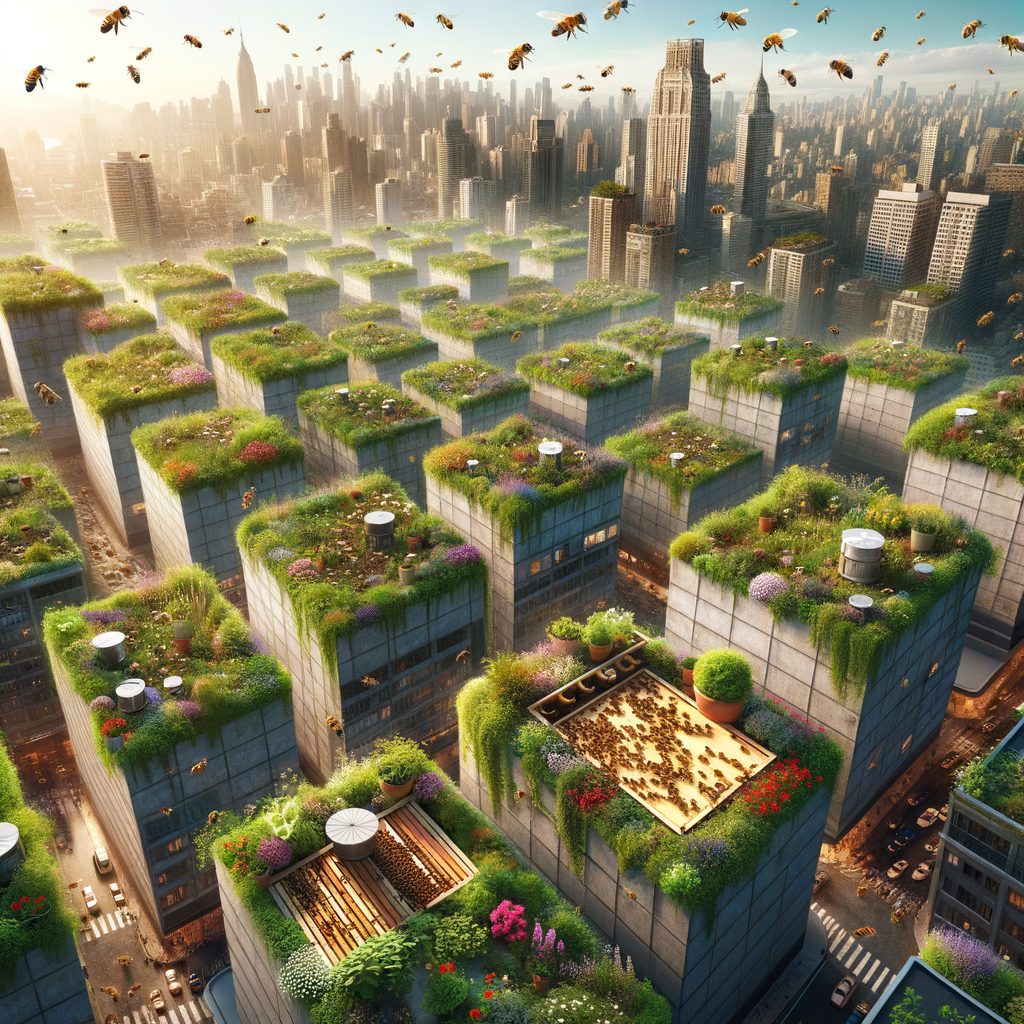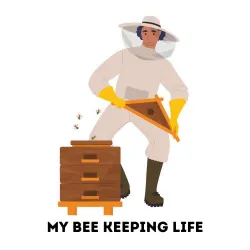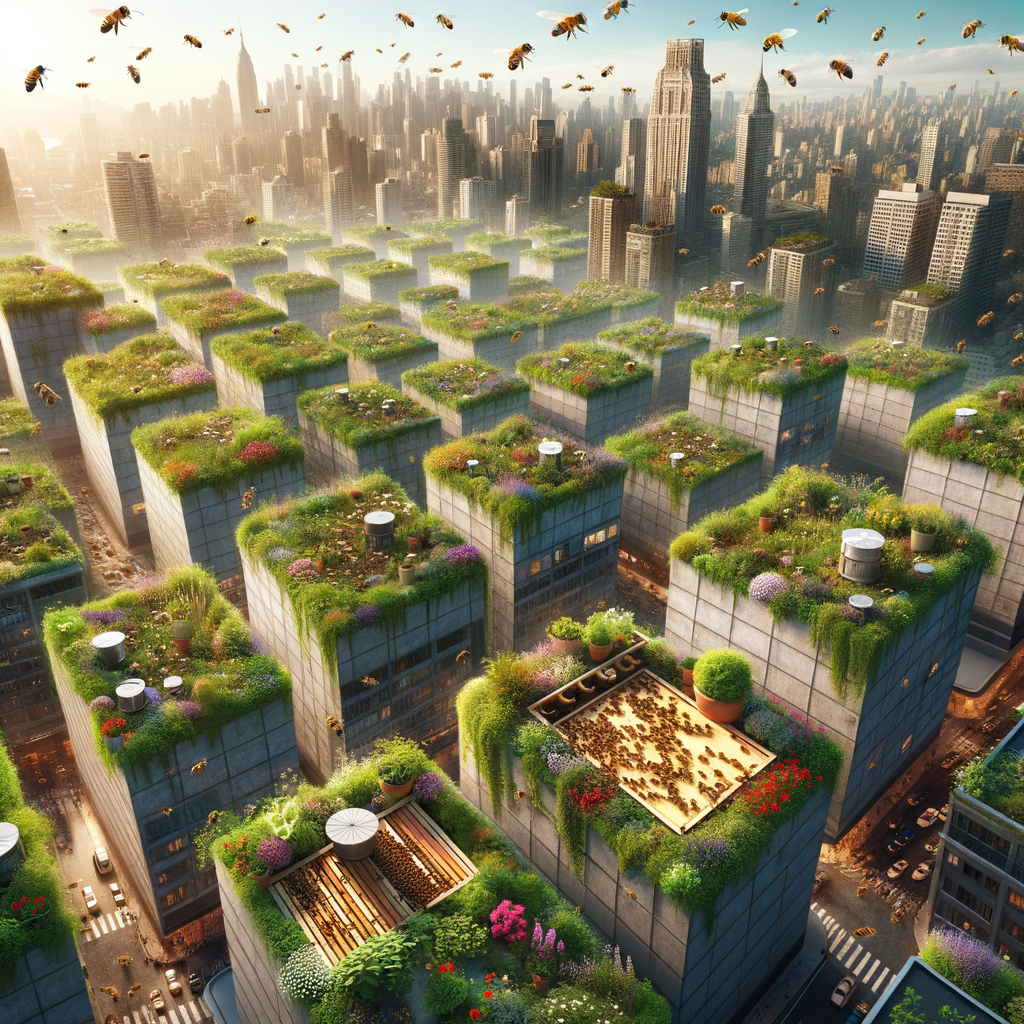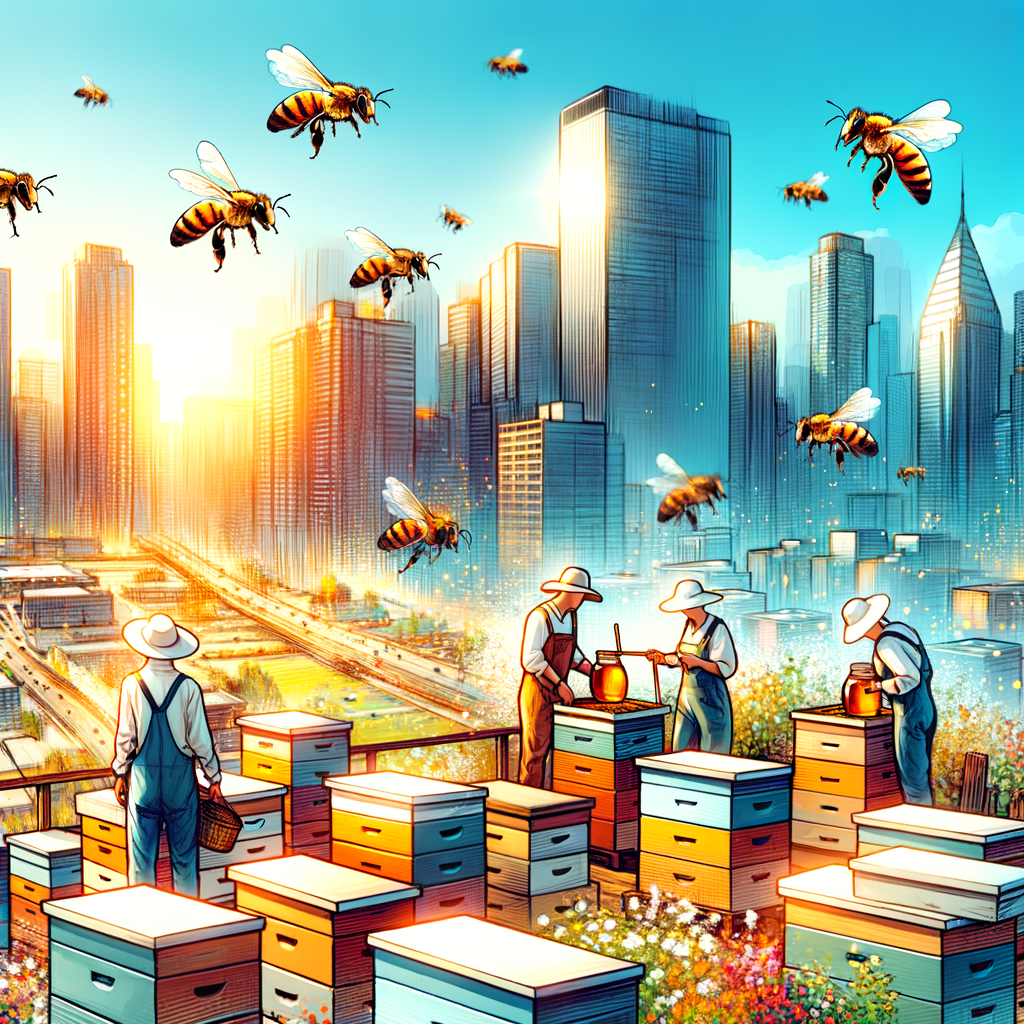
Introduction to Urban Beekeeping
Urban beekeeping is a fascinating and rewarding activity that is gaining popularity in cities worldwide. It’s not just about honey production; it’s also about promoting sustainability and biodiversity in our urban environments. Let’s dive deeper into what urban beekeeping entails and how it contributes to sustainable practices.
-
- Definition of Urban Beekeeping
Urban beekeeping, also known as urban apiculture, is the practice of keeping bee colonies in urban areas. This can be done on rooftops, balconies, backyards, or any available green space. The bees are kept in man-made hives, which can be as simple as a wooden box with frames for the bees to build their honeycombs. The primary goal of urban beekeeping is to increase the population of bees, which are essential for pollination and, therefore, the survival of many plant species.
-
- Overview of Sustainable Beekeeping Practices
Sustainable beekeeping is all about maintaining the health and productivity of bee colonies in a way that does not harm the environment or the bees themselves. This includes practices such as:
-
-
- Responsible Colony Management: This involves regular monitoring of the bees for any signs of disease or stress, and taking appropriate action when necessary.
- Natural Pest Control: Instead of using harmful chemicals, sustainable beekeepers use natural methods to control pests and diseases that can harm the bees.
- Local Sourcing: Whenever possible, sustainable beekeepers source their bees and beekeeping supplies locally to reduce the carbon footprint associated with transportation.
-
By adopting these and other sustainable practices, urban beekeepers can help ensure the survival of bees and the continuation of their vital role in our ecosystem.
Advantages of Sustainable Beekeeping
When we talk about sustainable beekeeping, we’re referring to a practice that not only benefits the bees but also the environment and our communities. Let’s explore some of the key advantages of this eco-friendly approach.
-
- Enhancement of Urban Biodiversity
Bees play a crucial role in pollination, which helps plants to grow, breed, and produce food. They transfer pollen between the male and female parts of a flower, enabling plants to make fruit and seeds. In urban areas, where green spaces are often limited, sustainable beekeeping can significantly enhance biodiversity. By introducing bees into the city, we can help a wide variety of plants to flourish, creating a more diverse and vibrant urban ecosystem.
-
- Contribution to Local Economy
Sustainable beekeeping can also have a positive impact on the local economy. By producing honey and other bee products locally, we can reduce the need for imports, support local businesses, and create jobs. For example, in 2019, the U.S. honey industry was worth over $300 million, providing income for thousands of beekeepers and contributing to the economy of many rural and urban communities.
-
- Improvement of Food Security
Finally, sustainable beekeeping can help to improve food security. Bees are essential for pollinating many of the fruits, vegetables, and nuts we eat. In fact, it’s estimated that one third of the food we consume each day relies on pollination mainly by bees. By promoting sustainable beekeeping, we can help to ensure a stable and diverse food supply for our cities.
In conclusion, sustainable beekeeping offers a host of benefits, from enhancing urban biodiversity and boosting the local economy, to improving food security. It’s a practice that deserves our attention and support.
Urban Honey Production
Urban honey production is a fascinating process that involves the careful cultivation of bees in city environments. This process is not only beneficial for the environment but also provides a sustainable source of honey. Let’s delve into the process of urban honey production.
Process of Urban Honey Production
The process of urban honey production can be broken down into two main steps: setting up urban beehives and harvesting urban honey. Each of these steps requires careful planning and execution to ensure the health of the bees and the quality of the honey produced.
-
- Setting up Urban Beehives
Setting up urban beehives involves selecting a suitable location in the city where the bees can thrive. This location should be away from heavy traffic and noise, but close enough to a variety of flowers for the bees to gather nectar. The beehive itself should be designed to protect the bees from harsh weather conditions and predators.
-
- Harvesting Urban Honey
Harvesting urban honey is a delicate process that involves removing the honeycombs from the beehive without disturbing the bees. The honeycombs are then spun in a centrifuge to extract the honey, which is filtered and bottled for consumption. This process should be done with care to ensure the bees are not harmed and the quality of the honey is maintained.
By understanding and respecting the process of urban honey production, we can enjoy the fruits of the bees’ labor while also supporting their vital role in our environment.
Benefits of Urban Honey Production
Urban honey production is not just a hobby for city dwellers; it also offers a wealth of benefits. Let’s delve into the health and economic benefits of urban honey.
- Health Benefits of Urban Honey
Urban honey is a natural treasure trove of health benefits. It is rich in antioxidants, which help protect your body from cell damage due to free radicals. Consuming urban honey can also help soothe a sore throat and boost your immune system. It’s a healthier alternative to processed sugar and can be used in a variety of recipes.
Moreover, urban honey is often produced from a diverse range of flowers in city parks and gardens. This diversity can lead to a broader spectrum of pollen in the honey, potentially helping to boost your immunity to local allergens. It’s like a delicious, natural medicine right from your city’s backyard!
- Economic Benefits of Urban Honey Production
Urban honey production can also have significant economic benefits. By setting up beehives in urban areas, we can create local jobs and stimulate the local economy. Honey, beeswax, and other by-products can be sold, generating a steady income for urban beekeepers.
Furthermore, urban beekeeping promotes sustainability. Bees play a crucial role in pollinating plants, which is vital for food production. By maintaining healthy bee populations in cities, we can contribute to food security and biodiversity, which in turn can have positive economic impacts.
It’s a way to improve our health, boost our local economy, and contribute to a more sustainable future.
Benefits of Urban Apiculture
Urban apiculture, also known as city beekeeping, is not just a hobby. It has significant benefits that impact our environment, society, and economy. Let’s delve into these benefits:
-
- Environmental Impact
Urban beekeeping plays a critical role in preserving our environment. Bees are excellent pollinators, helping plants to reproduce. Without bees, many of our favorite fruits and vegetables would become less common, and the overall health of our ecosystems would decline. A study by the USDA found that bees help to pollinate nearly 75% of the fruits, nuts, and vegetables grown in the United States. By maintaining hives in urban areas, we can help to bolster bee populations and promote biodiversity.
-
- Social Impact
Urban apiculture also has a significant social impact. It’s an educational tool that can be used to teach people about the importance of bees to our ecosystem. It can also bring communities together, fostering a sense of shared responsibility and cooperation. Many urban beekeepers share their knowledge and experience with others, creating a ripple effect of awareness and action towards environmental conservation.
-
- Economic Impact
Lastly, urban beekeeping can have a positive economic impact. The honey produced by urban bees can be sold, providing a source of income for beekeepers. Furthermore, the increased pollination by bees can lead to higher yields for local gardens and farms, boosting local economies. According to a report by the United Nations, the global economic value of pollination amounts to hundreds of billions of dollars each year, underscoring the economic importance of bees.
Urban apiculture is a practice that benefits not only the bees but also the environment, society, and economy. By understanding and promoting these benefits, we can contribute to a more sustainable and resilient urban future.
Sustainable Urban Honey Farming
Urban honey farming is not just about producing honey. It’s about creating a sustainable environment for our buzzing friends, the bees. Let’s delve into the practices that make urban honey farming sustainable.
Practices in Sustainable Urban Honey Farming
There are two main practices that are crucial to sustainable urban honey farming: responsible beekeeping and organic honey production.
-
- Responsible Beekeeping
Responsible beekeeping is the cornerstone of sustainable urban honey farming. It involves taking care of bees in a way that respects their natural behaviors and needs. This includes providing them with a suitable habitat, ensuring they have access to a diverse range of flowers for foraging, and protecting them from pests and diseases. It also means not over-harvesting honey, leaving enough for the bees to eat during the winter months.
-
- Organic Honey Production
Organic honey production is another key practice in sustainable urban honey farming. This means that the bees are not exposed to harmful chemicals, pesticides, or antibiotics. Instead, they are allowed to forage on organic flowers and plants, resulting in pure, natural honey. Organic honey production not only benefits the bees, but it also ensures that the honey we consume is free from harmful residues.
By adopting these practices, urban honey farmers can help ensure the survival of our precious bee populations, while also producing high-quality, organic honey. It’s a win-win situation for everyone involved.
Impact of Sustainable Urban Honey Farming
Sustainable urban honey farming is not just about producing delicious, natural honey. It also has significant impacts on urban ecosystems and local economies. Let’s delve into these impacts.
-
- Boosting Urban Ecosystem
Bees play a crucial role in our environment, especially in urban ecosystems. They are excellent pollinators, helping plants to reproduce. This is vital for the growth of flowers, fruits, and vegetables in our urban gardens and parks. When we practice sustainable urban honey farming, we increase the number of bees in our cities. This, in turn, boosts the urban ecosystem, making it more vibrant and diverse.
-
- Supporting Local Economies
Sustainable urban honey farming also supports local economies. When urban beekeepers sell their honey and other bee products, they generate income. This money often stays within the community, supporting local businesses and services. Furthermore, urban beekeeping can create jobs, from beekeeping itself to the manufacturing and selling of bee-related products. Thus, sustainable urban honey farming can be a source of economic growth and development in our cities.
It’s about creating healthier, more vibrant cities and supporting local communities. So, the next time you enjoy a spoonful of urban honey, remember the positive impact it’s making on your city.
Eco-friendly Beekeeping
Eco-friendly beekeeping is a sustainable practice that aims to protect and preserve the environment while still producing honey and other bee products. It involves methods that are kind to bees, beneficial to the environment, and healthy for consumers. Let’s delve into the practices and benefits of eco-friendly beekeeping.
-
- Practices of Eco-friendly Beekeeping
Eco-friendly beekeeping practices are designed to minimize harm to bees and their habitats. Here are some key practices:
-
-
- Natural Beekeeping: This method avoids the use of chemicals and synthetic materials in the hive. It promotes the health and well-being of the bees.
- Responsible Harvesting: Beekeepers only take what is extra, leaving enough honey and pollen for the bees to survive the winter.
- Planting Bee-friendly Flowers: Planting a variety of flowers that bloom at different times of the year provides bees with a constant source of food.
- Benefits of Eco-friendly Beekeeping
-
Eco-friendly beekeeping has numerous benefits for the bees, the environment, and us. Here are some key benefits:
-
- Healthier Bees: Natural beekeeping methods lead to healthier bees and stronger colonies, reducing the risk of diseases and colony collapse.
- Environmental Protection: By avoiding harmful chemicals and promoting biodiversity, eco-friendly beekeeping helps to protect the environment.
- Quality Products: Honey and other bee products produced through eco-friendly methods are pure, natural, and free from harmful residues, making them healthier for consumers.
As we can see, eco-friendly beekeeping is a win-win for everyone. It’s a practice that respects and protects our precious bees, while also providing us with high-quality, natural products. By adopting eco-friendly beekeeping practices, we can contribute to a healthier and more sustainable world.
Urban Beekeeping Sustainability
Urban beekeeping is a practice that has gained popularity over the years due to its numerous benefits. However, it’s not without its challenges. In this section, we will delve into the difficulties faced in urban beekeeping sustainability and how they impact the environment and our food system.
Challenges in Urban Beekeeping Sustainability
Urban beekeeping, while beneficial, faces several hurdles that can hinder its sustainability. Two of the most pressing challenges include urbanization and habitat loss, and pesticide exposure.
-
- Urbanization and Habitat Loss
Urbanization is the process of cities and towns expanding, often leading to the loss of natural habitats. This loss is detrimental to bees as it reduces the availability of flowers for foraging, leading to a decrease in their population. Bees play a crucial role in pollination, which is vital for food production. Therefore, habitat loss due to urbanization poses a significant threat to urban beekeeping sustainability.
-
- Pesticide Exposure
Pesticides used in urban areas to control pests can have a harmful effect on bees. These chemicals can contaminate the nectar and pollen that bees collect, leading to their decline. Some pesticides can even cause immediate death to bees. This exposure to harmful pesticides is a significant challenge to the sustainability of urban beekeeping.
These challenges need to be addressed to ensure the survival and prosperity of bees in urban settings, which is crucial for our food systems and the environment.
Solutions for Urban Beekeeping Sustainability
As we continue to face the challenges of urban beekeeping sustainability, it’s crucial to explore viable solutions. Two key strategies can significantly contribute to the sustainability of urban beekeeping: creating bee-friendly urban spaces and advocacy and education.
- Creating Bee-friendly Urban Spaces
One of the most effective ways to support urban beekeeping sustainability is by creating bee-friendly spaces in our cities. These spaces can be as simple as a small garden or as complex as a rooftop apiary. The key is to provide bees with a safe and nourishing environment where they can thrive.
Urban spaces that are rich in diverse plant life not only provide bees with the necessary pollen and nectar but also create a beautiful and vibrant urban landscape. Planting native flowers, avoiding the use of harmful pesticides, and providing clean water sources are some of the ways we can make our cities more bee-friendly.
- Advocacy and Education
Advocacy and education are equally important in promoting urban beekeeping sustainability. By raising awareness about the importance of bees and the challenges they face, we can inspire more people to take action.
Education programs can teach people about the role bees play in our ecosystem, the benefits of urban beekeeping, and how they can contribute to its sustainability. Whether it’s by becoming an urban beekeeper, planting a bee-friendly garden, or simply spreading the word, every action counts.
By implementing these strategies, we can ensure that our cities continue to buzz with the vital activity of bees.
Case Studies: Beekeeping in Sustainable Cities
Let’s take a closer look at how sustainable beekeeping has been implemented in different cities around the world. We will focus on two cities, City A and City B, to understand the impact and benefits of urban beekeeping.
-
- Case Study 1: City A
City A, a bustling metropolis, has embraced the concept of urban beekeeping with open arms. This city has transformed its rooftops and unused urban spaces into thriving bee farms. The local government has been supportive, providing training and resources to aspiring beekeepers.
As a result, City A has seen a significant increase in local honey production. Not only has this boosted the local economy, but it has also led to a healthier urban ecosystem. The bees have helped to pollinate local plants, leading to more green spaces in the city.
Moreover, the residents of City A have benefited from the fresh, locally-produced honey, which is known for its superior quality and taste. The success of City A’s beekeeping initiative serves as an inspiring example for other cities.
-
- Case Study 2: City B
City B, on the other hand, is a smaller city with a strong commitment to sustainability. Here, beekeeping has been integrated into the city’s urban planning strategy. The city has created designated beekeeping zones in parks and community gardens, encouraging residents to take up beekeeping as a hobby.
This initiative has fostered a sense of community among the residents of City B, as they work together to maintain the bee hives and harvest the honey. Furthermore, the city has seen a rise in biodiversity, as the bees have attracted a variety of other insects and birds.
City B’s approach to urban beekeeping demonstrates how even smaller cities can contribute to sustainability and biodiversity through innovative strategies.
Both City A and City B have shown how urban beekeeping can contribute to sustainability, biodiversity, and community-building. These case studies provide valuable insights for other cities looking to implement similar initiatives.
Conclusion: The Future of Urban Beekeeping
As we have journeyed through the world of urban beekeeping, we have seen its immense benefits and the potential it holds for our cities and our planet. The future of urban beekeeping is bright and filled with opportunities. Let’s summarize the key takeaways and look at the future prospects of this sustainable practice.
-
- Key Takeaways
Urban beekeeping is not just about honey production. It’s a sustainable practice that contributes to the biodiversity of our cities, supports the pollination of plants, and helps in the fight against climate change. It’s a way to reconnect with nature, right in the heart of our urban landscapes.
Through sustainable beekeeping, we can produce local, high-quality honey, reducing the need for imported honey and the carbon footprint associated with its transportation. Urban beekeeping also provides educational opportunities, raising awareness about the importance of bees to our ecosystem.
-
- Future Prospects
The future of urban beekeeping is promising. As more people become aware of its benefits, we can expect to see more rooftop hives in our cities. There is also potential for innovation in this field, with new technologies and practices that could make urban beekeeping even more sustainable and efficient.
However, the success of urban beekeeping depends on the support of local communities and governments. Policies that encourage urban beekeeping, provide training for aspiring beekeepers, and protect bees from harmful pesticides will be crucial for the growth of this practice.
Remember, urban beekeeping is more than a trend. It’s a powerful tool for sustainable urban development and a hopeful vision for the future. As we look forward, let’s continue to support and promote this practice, for the sake of our bees, our cities, and our planet.








